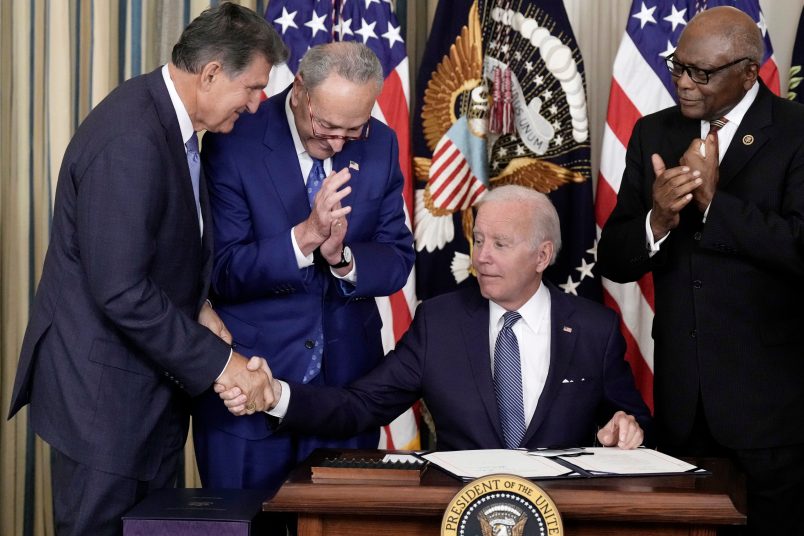I’ve written in general against post-election recriminations since November 5th. This post may seem like one such recrimination on the surface. But I think if you bear with me, you’ll see that it’s really not. I should be clear, too, that being anti-recriminations, whatever that might mean, doesn’t or shouldn’t mean people shouldn’t try to figure out what was done right or wrong, criticize whoever needs to be criticized. Of course they should. What it means to me at least is that in the desolation of a really, really hard defeat, a very consequential one, people shouldn’t rush in to take shots at the folks they’ve always had it in for, using the devastation less as a wound to overcome than an opportunity for the old score-settling.
So here’s the issue I want to discuss.
Until his campaign began to come undone this last summer, it was widely understood and accepted among Democrats that Joe Biden, to the surprise of many, was the most progressive Democratic president, with the most consequential progressive legislative agenda, in at least half a century. This was widely believed because it was unquestionably true. Because of a series of decisions by both Biden and Sen. Bernie Sanders, Biden ended up governing with a trimmed down version of the legislative agenda of the progressive left. What counts here as “trimmed down” is obviously a pretty critical question. There was no Medicare for All. But on lots of policy and regulatory positions, the left’s agenda was Biden’s. This isn’t just me saying this. Ask Bernie Sanders, or at least ask him until a week ago. The point I’m making here really isn’t open to much debate.
There were two arguments for this agenda, a policy argument and a political argument. The policy argument is simply that it was good policy; I argued this at the time and still believe it. The second argument, the political one, was that these policies would build constituencies that would help win elections. Not elections as an end in themselves but win elections which would then make it possible to expand or entrench policies and win more elections going forward. In progressive left social media there was even a whole discourse about this during the Trump years: Don’t make it complicated. Find the people who need money and give them money. They’ll be glad you did and you’ll gain new political supporters.
I want to emphasize again that I’m not saying those policies were a mistake. I support them now as much as I did then. That’s a big reason why I wouldn’t assess Joe Biden’s historical legacy too soon, though it looks pretty broken and withered at the moment. But here’s the thing: the political argument, as near as I can tell, was a total flop. No one noticed. No one gave a fuck. Or perhaps it would be better to say that there’s little evidence that the recipients of those programs meaningfully connected the funds to political action in any way. There’s no evidence any of it had any meaningful impact in the 2022 or 2024 elections.
That’s a pretty big reality the Democratic political coalition has to grapple with.
This is why I was surprised and thought Bernie Sanders was really showing his worst side when he came right out of the gate after Harris’ defeat saying: “It should come as no great surprise that a Democratic Party which has abandoned working class people would find that the working class has abandoned them.”
I mean, wait a second, Bernie. What about everything in American Rescue Plan and the Inflation Reduction Act? I know those weren’t exactly the bills a President Sanders would have passed. But they weren’t the ones Biden tried to pass either. The Inflation Reduction Act was a scaled back version of Build Back Better, which proved impossible to pass with the tight 50+1 majority in the Senate.
I guess a more generous interpretation of Sanders’ remark is that he was talking about the perception that Kamala Harris had distanced her campaign from Biden’s progressive agenda. But my real point here is that I don’t see how you can act like Joe Biden’s agenda was like Bill Clinton’s or even Barack Obama’s and come out of the gate acting like this was the predictable outcome of neoliberal policies. Biden’s legislative and governing agenda was ambitious and represented a decisive shift toward much more progressive policies and indeed toward pursuing a full employment economy as a policy goal. And politically how did it work? You can’t write all that off like it didn’t happen.
Now there are a few possible rejoinders to what I’m saying here. So let me bring them up. One is that key support coming out of the pandemic was temporary. And some of it actually sunsetted just as inflation was hitting the U.S. economy. So the cut off of some of those programs may have contributed to the public anger and discontent caused by the inflationary jolt of 2021 to 2023. Another possibility is that Democrats passed several good pieces of legislation but simply didn’t get the word out about them. We can look at this possibility in two ways. You could argue that messaging wasn’t well-executed in the framework of conventional political messaging. Or perhaps Democrats just need an entirely new way of approaching connecting the impact of their programs to public opinion and subsequent political choices. In this second case perhaps even the vocabulary of “messaging” sets us off on the wrong track.
I think that each of these counters is valid to a degree. But it doesn’t cut it to just say … “well, the Biden White House did a bad job of messaging. And that’s the answer.” The disconnect is too big.




